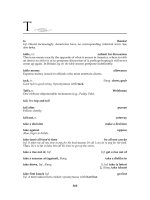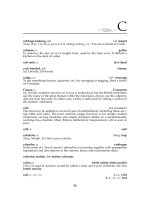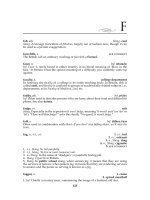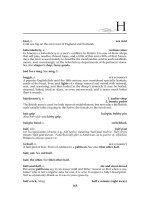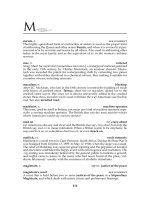British English A to Z - past 11
Bạn đang xem bản rút gọn của tài liệu. Xem và tải ngay bản đầy đủ của tài liệu tại đây (180.64 KB, 23 trang )
360
ta thanks!
Inf. Heard increasingly. Americans have no corresponding informal term. See
also ta-ta.
table, v.t. submit for discussion
This term means exactly the opposite of what it means in America, where to table
an item is to shelve it or to postpone discussion of it, perhaps hoping it will never
come up again. In Britain lay on the table means postpone indefinitely.
table money allowance
Expense money issued to officials who must entertain clients.
tack, n. Slang. chow; grub
Good tack is good eating. Synonymous with tuck.
Taffy, n. Welshman
One of those objectionable nicknames (e.g., Paddy, Paki).
tail. See top and tail
tail after pursue
Follow closely.
tailcoat, n. cutaway
take a decision make a decision
take against oppose
Also, begin to dislike.
take (one) all (one’s) time be all one can do
Inf. It takes me all my time to pay for the food means It’s all I can do to pay for the food.
Thus, He’s so fat it takes him all his time to get up the stairs.
take a rise out of, Inf. Inf. get a rise out of
take a scunner at (against), Slang. take a dislike to
take down, Inf., Slang. 1. Inf. take (a letter)
2. Slang. take (cheat)
take first knock Inf. go first
Inf. A term taken from cricket; synonymous with bat first.
t
h
take in charge arrest
See under charge-sheet.
take into care see comment
When a child is taken from its parents who are deemed unfit, in America the
authorities are said to take custody of the child. In Britain, the child is taken into
care.
take it in turns to take turns
The British form is followed by the infinitive of the verb, the American form by a
gerund. Thus in Britain two good friends of a sick man would take it in turns to sit
by his bedside, while in America they would take turns sitting there.
take no harm suffer no harm
take on Inf. catch on
Inf. Catch on is used in Britain as well.
take (someone’s) point see (someone’s) point
I take your point rather than the American I see your point or I get your point.
take silk see comment
Become a Q.C., Queen’s Counsel, or K.C., King’s Counsel, both specially recognized
barristers. The title depends upon the sex of the sovereign. The word silk, by
itself in this context, denotes such a counsel, thus: John Jones, a silk, accepted the
brief (i.e., took the case). The silk is the robe worn to replace the ordinary robe
worn by other than a Q.C. or K.C.
take the biscuit Slang. take the cake
Slang. As in That takes the biscuit! To surpass all others, especially in stupidity,
cheek, impudence, effrontery, and the like.
take the mickey out of Inf. act disrespectfully toward
Aggressively undermine someone’s self-confidence. Also, take the mick out of; take
the piss out of.
take the piss out of. See take the mickey out of.
take the rise out of, Inf. Inf. get a rise out of
take the shilling enlist
Inf. From the days when the Recruiting Sergeant gave the new recruit a shilling,
known as the King’s (or Queen’s) shilling.
take (make) up the running take the lead; set the pace
A racing term, often used figuratively of, e.g., participants in a conversation who
seem to compete with one another in their exchange.
taking, n. Inf. state of agitation
Inf. To be in a taking is to be upset, to be having a fit of anger or nerves. An old-
fashioned idiom.
takings, n. pl. revenue
takings
361
The term is applied mostly to small businesses, e.g. shops and market stalls, and
most often to the money taken in a single day’s business.
talent-spotter talent scout
Both terms used in both countries.
talk the hind leg off a donkey Inf. talk a blue streak
Inf. Or off an iron pot.
talk through (out of) the back of one’s neck. Inf. Inf. talk through one’s hat
With never an end in sight.
tally plan installment plan
A tally plan or tally system was the method by which a tally shop, owned or ser-
viced by a tallyman or tallywoman, operated a retail business accommodating
needy customers who could not pay cash, the accounts being recorded in a pair
of matching books, one for each party, and usually paid weekly without billing.
In depressed areas, the practice has given way to regular installment buying,
called hire-purchase, or more popularly the never-never, in Britain.
Tannoy, n. Inf. P.A. system
Inf. A proprietary name gone generic.
tap, n. faucet
Tap (as a noun) is heard in America, faucet is also heard in Britain. But Americans
speak of tap-water, never faucet-water.
taped, adj. Slang. nailed down
Slang. One who has it all taped has thought of everything, and provided for all
contingencies; he’s got it all worked out, and buttoned down.
taplets. See shares.
tap stocks. See shares.
taradiddle, tarradiddle, n., Inf. Slang. fib
tardy adj. sluggish
Also has the American meaning of ‘late.’
tariff, n. 1. schedule of charges
2. minimum sentence
1. In Britain, this word used alone can mean ‘hotel charges’ or ‘restaurant
charges.’
2. Especially one imposed by the Home Secretary rather than a judge.
tarmac, n. 1. blacktop
2. airfield
1. In America tarmac refers to the bituminous binder used in the making of tar
roads. Tarmac started out as a trademark for a binder for road surfaces, but now
generally refers to any bituminous road surface binder. It is a shortening of tar
macadam, which in America describes a pavement built by pressing a tar binder
over crushed stone, and in Britain a ‘prepared tar concrete poured and shaped on
362
talent-spotter
a roadway to construct a hard surface.’ As a transitive verb, tarmac means to tar a
road. See also macadam.
2. Tarmac has now acquired the specialized meaning of ‘air-field,’ especially the
part made of this material.
tart, n. 1. pie
2. loose woman
1. What Americans think of when they recall Mom’s apple pie or cherry pie
would often be an apple tart or cherry tart in Britain. For the meanings of British
pie see pie.
2. Favorite epithet of jealous wives on the way home from a party at which their
husbands have looked longingly at another female.
tart up Slang. doll up
Slang. Often applied to interior decoration, and almost invariably pejorative,
indicating that the décor was gaudy, and possibly tawdry as well. He had his digs
tarted up by a Knightsbridge designer. Also used in reference to writing style: She
writes a dreadfully tarted up prose. Overdone is the adjective that comes to mind, but
perhaps it is stronger than that.
ta-ta, interj. Inf. bye-bye
Inf. (First a as in hat, second as in hah, stress more or less equal). Such baby-talk
is heard among adult cockneys, as is ta.
tater, ‘tatur, tatie, n. Slang. spud
Slang. The lowly potato, always welcome at the dinner table.
tatt, n., v.i. 1. n. frills
2. v.i. fritter away one’s time
1. n., Slang. The décor of the apartment was lovely and without tatt.
2. v.i., Slang. Do more or less useless jobs just to pass the time.
tatties Inf. potatoes
Especially in Scotland.
tatty, adj., Inf. shabby
See grotty.
taws, n. lash
A thong, cut into narrow strips at the end, used for chastising children. Also
tawse. A Scottish word.
taxman, n. Inf. the Inland Revenue
Or any of its employees, especially those whose job it is to deal directly with
taxpayers.
tax point, n. effective date
An example of this tax usage: V.A.T. (value added tax) on certain items went up
from 8 percent to 25 percent May 1, 1975. An order for such an item is given April
25 for delivery May 2. You pay 25 percent, says the tax office: the tax point is the
delivery date, not the date of the order.
tea, n. see comment
In Britain, one drinks afternoon tea at about 4:00 p.m., taken with biscuits, bread
and jam, scones, and the like. But tea also covers an evening meal consisting of
tea
363
a light supper. Tea in this sense is heard primarily among the working class and
children, and is really short for high tea.
teach someone’s grandmother to suck eggs instruct an expert
Slang. To attempt to instruct or advise someone more experienced than oneself,
or to try to educate an expert on a matter within his field—like telling Albert Ein-
stein how to approach the matter of relativity.
tea lady see comment
The member of the staff at the office or shop who makes and brings around the
tea at 11:00 a.m., and 4:00 p. m. There will be a biscuit or two as part of the offer-
ing. It is considered good practice to suspend business discussion during the cer-
emony. Occasionally tea gives way to coffee, but the functionary in question will
never be called the coffee lady. This job, like the relaxed style of office life in which
it plays a role, is increasingly rare.
tear a strip off (someone) Slang. bawl (someone) out
Slang. The strip is a noncommissioned officer’s stripe. The expression, in military
circles, suggests demotion for a misdemeanor.
tearaway, n. Inf. hell-raiser
Inf. The term does not necessarily imply a bad character. A tearaway is a wild
youngster, a cut-up, who is probably going to straighten out in time.
tease, n. Inf. tricky job
Inf. “It was quite a tease,” said the Mr. Fixit, explaining why it took so long and
cost so much for what had at first seemed the simple job of repairing the lawn
mower.
teat, n. 1. nipple
2. bulb
1. On a baby bottle.
2. The rubber bulb of a medicine dropper.
tea-towel, n. dish towel
Mostly designed for drying dishes. Also referred to as a washing-up cloth.
teetotalist. See TT.
telegraph pole telephone pole
Both functions are served in both countries, which somehow assign different pri-
orities to the respective wires.
telephone box. See call-box; kiosk.
telephonist, n. switchboard operator
(Accent on the second syllable.)
telly, n., Inf. Inf. TV
Also, goggle-box. See also have square eyes.
temporary guest transient
Hotel term.
364
teach someone’s grandmother to suck eggs
ten. See under twenty.
tenner, n. sawbuck
Inf. A ten-pound note (bill).
term, n. trimester
Term, in the British system, and semester and trimester in the American, are the
respective designations for fixed parts of the school year. To complicate matters
still further, terms often have quite different names in different British institu-
tions. As only one example, the three eight-week terms at Oxford are called
Michaelmas, Hilary, and Trinity. At Cambridge they are Michaelmas, Lent, and
Easter. Half-term is a brief vacation occurring about midway through the term in
most British schools.
terminus, n. terminal
A railroad or bus term. The British, however, use terminal to refer to the city cen-
ter where one picks up the bus to the airport.
terrace, n. row of joined houses
A specialized British use of the word. A terrace house is known as a row house in
America. See semi-detached.
terraces, n., pl. standing room
Used only of a sports arena. Sometimes terracing.
Test. See Test Match.
test bed, n. proving-ground
Literally, an iron framework for resting machinery being tested.
Test Match international match
This is principally a cricket term, now also applied to rugger. A Test Match, e.g.,
between England and Australia, has about the same importance in England as
the World Series in America. The English team is always referred to as the England
side, never the English side; but the Australians are always referred to as the Aus-
tralian side, the West Indians as the West Indian side, etc. Test Match is often short-
ened to Test: thus, What happened in the Melbourne Test? See also cricket.
Thatcherite, adj. see comment
Describing the extreme free-marketeering policies of Margaret Thatcher, prime
minister from 1979 to 1990, and of those who have followed her beliefs. The
closest comparison in recent American politics would be Reaganite, and Lady
Thatcher and President Reagan were close ideological allies.
that cock won’t fight that excuse (plea, plan) won’t work
that’s it! right!
that’s the job! Slang. that’s the ticket!
Slang. Often that’s just the job!
that’s the job!
365
that’s torn it! Slang. that does it!
Slang. Said in exasperation when things have gone wrong.
theatre, n. operating room
Short for operating-theatre; a theatre sister is an operating-room nurse; a confinement
theatre is a labor room. See comments under lint and sister.
then? see comment
A bit of friendly jocularity. Then? at the end of a sentence is little more than punc-
tuation. “Been doing a bit of work, then?” says the gardener to the boss as he
notes a weeding job done in his absence. “Off on a holiday, then?” says your rustic
neighbor, as he strolls by and catches sight of you lugging a valise to your car.
theological college divinity school; seminary
there’s a . . . that’s a . . .
As in, There’s a good boy.
there’s no shifting it Inf. it’s unshakable
Inf. Once he’s made up his mind, there’s no shifting it. Seems to be used only in the
negative.
thermic lance blowtorch
Rarely heard nowadays.
thick, adj. Inf. dull and stupid
And someone who is dull and stupid could be called a thicko or a thicky. As thick
as two short planks is a standard insult.
thick ear, Slang. cauliflower ear
thin on the ground few in number
Inf. Often used to mean ‘short of help,’ ‘understaffed.’
third party insurance liability insurance
Third Programme see comment
The BBC (British Broadcasting Company) broadcasts four different radio pro-
grams, Radio 1, 2, 3, and 4, in addition to two television programs, BBC 1 and BBC
2. In the early days, there were only three radio programs, known as the First, Sec-
ond and Third Programmes. The last-named maintained a higher intellectual and
artistic level than the other two, so that to be Third Programme was to be something
of an intellectual, or to have leanings in that direction, and to be interested and
more or less versed in the arts. Now it’s Radio 3 for the highbrows.
threap, n., v.t. 1. n. accusation.
2. v.t. scold
Heard in Scotland and the North of England.
three-star. See four-star.
threshold agreement union cost-of-living contract
366
that’s torn it!
Throgmorton Street approx. Inf. Wall Street; the market
Inf. A street in the City of London whose name is used as a nickname for the Lon-
don Stock Exchange, and the securities fraternity and their activities generally, just
as nearby Mincing Lane is used for the wholesale tea business. The British often
use the term the City to denote the financial community as a whole. See City.
throstle, n. song-thrush
through, adj. 1. connected
2. still in contention
1. This meaning is restricted to telephone operator usage. Thus, You’re through!
means ‘Your party is on the line!’ or ‘You’re connected!’ When a British telephone
operator says You’re through! it sounds about as grim to an American as Your time
is up! must sound to a Briton. In Britain the operator does not tell you when your
time is up; instead there are three short beeps on a long distance call or a series of
rapid pips on a local call from a pay station. No pips when you dial directly from
a private telephone.
2. This meaning relates to elimination competitions in sports, called knock-outs
in Britain. Thus (in cricket): In the North, Yorkshire and Lancashire are through. That
means that they are ‘still alive’ in American sports parlance. Through, in Ameri-
can English, would more likely be taken to mean the exact opposite: ‘finished,’
‘eliminated.’
throw a wobbly Inf. see comment
To throw a wobbly is to express anger or uncertainty about something. It is akin to
having a temper tantrum: He threw a wobbly when he heard about the escalating build-
ing costs. But it may also connote anxiety about something: When he learned that he
would have to ride bareback, he threw a wobbly.
throw one’s bonnet (cap) over the windmill throw caution to the winds
Evokes the Victorian atmosphere of a young lady involved in an impetuous
elopement; but this expression is current usage.
throw out add on; build
Referring to adding an extension to a structure: to throw out a wing, thus enlarg-
ing a building or a room. The British also talk of throwing out a pier, i.e., building
one out into the water.
throw up, n. Inf. throw in
In both cases, it’s the sponge or the towel that is thrown up signaling defeat.
thumping, adj., adv. Inf. enormously
Inf. Rarely used by itself to mean ‘enormous,’ as in a thumping lie; usually in com-
bination with great or big; a thumping great feast. Thumping good means the same
thing: a thumping good victory is an overwhelming one.
The Thunderer Inf. The Times
The London newspaper, that is.
thundering, adv. Inf. mighty
Inf. In the sense of ‘extremely’—a thundering good actor; a thundering good piece
of mutton. An old-fashioned word.
thundering
367
thunder-mug, n. chamber pot
Slang. The commode that may contain it used to be referred to as a thunder-box.
Like the commodities in question, the terms are not common but are heard now
and then.
thundery trough line squall
A nautical term for a meteorological phenomenon to give one pause.
tick, v.t., v.i. check
Please tick where appropriate, seen in instructions for filling out a form or on an
advertisement coupon. A tick list is a check list. But see on tick; tick off.
tick, half a. See half a tick.
tick, on. See on tick.
ticket-of-leave, n. parole
A ticket-of-leave man is a prisoner who has served part of his sentence.
ticket pocket change pocket
Tailor’s term.
ticket tout, Slang. Slang. scalper
tickety-boo, adj. Slang. hunky-dory
Slang. Also spelled tiggerty-boo. All right.
tickler, n. Inf. poser
Inf. A delicate situation; a tricky problem.
tick off 1. check off
2. tell off
See tick.
tick over turn over
Referring to a car or other engine. Extended metaphorically, for example, to
office or business routine: When he’s away on holiday, things just tick over (activity
slows down).
tic-tac see comment
Inf. An arm-movement signaling system used by tic-tac men at racetracks to flash
the changing odds to resident bookies.
tiddler, n. minnow
Inf. This word is sometimes used informally as an epithet for little creatures, like
kittens and children, and can even be stretched to cover abstractions, like clues.
“We haven’t found a tiddler yet,” says the police investigator, meaning, “We
haven’t found even the most trifling clue.”
tiddl(e)y, adj., Inf. Inf. tipsy
Formerly, a word meaning ‘a drink.’
368
thunder-mug


